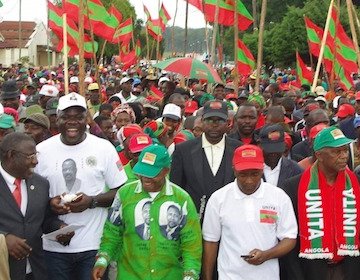- About
- Topics
- Picks
- Audio
- Story
- In-Depth
- Opinion
- News
- Donate
- Signup for our newsletterOur Editors' Best Picks.Send
Read, Debate: Engage.
Last week's elections in Angola marked the end of an era, that of president José Eduardo dos Santos, after 38 years in power. Aged 74, with his health weakened, the MPLA's (People’s Movement for the Liberation of Angola) historic leader stepped down, naming General João Lourenço to succeed him. As expected, the new face of the ruling party won the elections held on 23 August.
In terms of longevity, José Eduardo dos Santos’ leadership is only surpassed by Teodor Obiang, president of Equatorial Guinea. However, only in the past 15 years has the MPLA leader ruled in a climate of peace. Until 2002, the country was ravaged by a brutal 26-year civil war that culminated in the defeat of Jonas Savimbi's UNITA. Before that, the 13-year war of independence from Portugal greatly exhausted the country.
The years of peace have been synonymous with economic growth, mainly connected with the oil boom that generated a huge inflow of dollars into Angola. The sudden wealth, however, ended up in the hands of the very few, especially the elite that surrounds the former president. His eldest daughter, Isabel dos Santos, controls the oil giant Sonangol and became Africa's first female billionaire with a fortune worth 3.5 billion dollars. Her brother José Filomeno dos Santos, meanwhile, is the head of the country’s sovereign wealth fund.
Although Angola is Africa's second largest oil producer (behind only Nigeria) its revenue has not benefited the majority of Angolans, as the country has become one of the most unequal in the world, with two-thirds living in poverty. Freedom of the press and political opposition are severely hindered in a country where corruption is strife. In 2016, 17 political activists were released having spent one year in jail after they organised a public reading of a political book.
More recently, the slump in oil prices has hampered development and plunged Angola into a major financial crisis, which will now be inherited by new MPLA leader João Lourenço. Although few people believe he represents the real political change the country needs, Lourenço should seize the opportunity to push forward democratic reforms, tackling the country’s corruption problems, as it ranks 164 out of 176 on the 2016 Transparency International Corruption Perceptions Index.
Photo: Maka Angola
